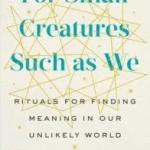
I remember as a boy reading Rachel Carlson’s Silent Spring (published in 1962), with its warning that pesticides were harming the environment and wildlife, particularly birds. This is just one of the chickens, turned grim reaper, now coming home to roost. Today we realise the crisis is much deeper and broader. It seems possible that the twenty-first century will witness the end of a habitable world. It seems that the very brief “Anthropocene age” was not successful. The reasoned conclusion of 91 leaders, mostly scientists, is that “human cannot continue to violate the fundamental laws of nature or of science with impunity. If we continue on our current path, the future of our planet is bleak.”(i)
Ideally, we will address all the crises that confront us (personal, societal, environmental) with mindfulness and equanimity. Drawing on a sense of inner peace and integration, we’ll engage most constructively with the situations that confront us, sustained by a deep inner calm. But it isn’t always so. Confronted by fearful situations, we’re deeply conditioned to fight (the ‘mighty warrior’) or flee (the ‘coward’ or the ‘invisible man’). Another kind of conditioning leads us to cultivate ignorance in the face of overwhelming threats (the ‘ostrich’). The multi-crisis of our time requires urgent actions, not passivity, nor an over-confident optimism– notwithstanding the Julian mantra, “All will be well, and all manner of things will be well”!
These days I’m asking myself what to do when confronted with the apparent fact that the earth itself is in midst of an existential threat. What’s popularly termed “climate change” and “global warming” are code words for something much larger. The crisis of our time – the crisis of the Anthropocene – is broader and deeper than we’d thought. Consequently, the solutions are staggering, almost unimaginable.
Our multi-dimensional challenge includes:
- Desertification: “While land degradation has occurred throughout history, the pace has accelerated, reaching 30 to 35 times the historical rate, according to the United Nations.”(ii)
- Loss of species: “Although extinction is a natural phenomenon, it occurs at a natural “background” rate of about one to five species per year. Scientists estimate we’re now losing species at up to 1,000 times the background rate, with literally dozens going extinct every day.”(iii)
- Unsustainable population growth: “The world now produces one million more members of the human family every 96 hours. The momentum of population growth is so great that is difficult to slow down and it is unlikely to cease in forthcoming decades.(iv)
- The death of our soil: “A third of the planet’s land is severely degraded and fertile soil is being lost at the rate of 24bn tonnes a year, according to a new United Nations-backed study.”(v)
- A growing ineffectiveness of antibiotics: “Antibiotic resistance is rising to dangerously high levels in all parts of the world. New resistance mechanisms are emerging and spreading globally, threatening our ability to treat common infectious diseases.(vi)
- The likelihood of a global killer flue: “Killer flu pandemic is inevitable and the world is not prepared, says WHO.”(vii)
- And, of course, global warming: “The Chernobyl exclusion zone shows a glimpse of a world inhospitable to life. According to a new climate policy paper, much of Earth could look the same by 2050 if humans don’t act fast to mitigate global warming.”(viii)
- These environmental crises are already straining the social fabric of nations and cultures. Wars might break out to secure dwindling resources, such as clean water. Cross-border migration will increase. Some sectors of society will loose out and may well resist the benefits accruing to a wealthy few. “The chaos that will occur globally if sea-level rise happens to the extent that it could, and with the rapidity it could, when you have millions of people who are on the move… that usually results, as we’ve seen in the Syrian refugee crisis, in political disruption and security problems,” says former US national security adviser Richard Clarke.(viii)
Thankfully each of these trends can be reversed. In some cases, benign conditions can be fully restored. But at what price? How much time do we have before it’s too late? It’s beyond my natural optimism to believe the world will rally to the challenge well before this century ends. And some say we only have a decade or so before irreversible destruction is inevitable – the “tipping point”.
I’m 77 this July. Though in reasonably good health, I’m not sure how much of the coming crises I’ll personally experience. But it looks like my children and their children will face a hellish future. My generation has been unusually privileged, pampered and at ease – and, as is now clear, horrendously irresponsible. I and my generation will not face the consequences of our contribution to these problems. But I’m still concerned to be part of the solution. As an uncurable altruist (as, I suppose, most SNS members are) I don’t want to selfishly enjoy a happy life “in the sun”, as it were, while I see the storm forming and rolling in. But what can one ordinary person do? I’m asking myself (as surely you are asking yourself), not just ‘What can be done?” but ‘What can I do?’
As Spiritual Naturalists we’ll avoid calling on God to intervene before the apocalyptic death of Mother Nature as we know her. A large section of humanity may retreat into prayer and faith-filled expectation either that God will make it all better, or (as the prospect grows dimmer and grimmer) take them away to a better place. But not all will respond in this way. History tells us that people of faith will likely lead the way in engaging with social problems. We should be prepared to work with them.
A first principle must be to prepare ourselves (psychologically and spiritually) to face the realities of the coming storm. Inner peace, based on a deep integration of our complex personhood, including an appropriate sense of meaning and values, is an immensely helpful strength for crisis times. We might say that a vital spirituality will give us the clarity of mind and resilience of heart to face problems of the greatest magnitude. If it makes all the difference in facing up to the inevitability of death, it ought to be able to fit us to fight to/work to ‘save the planet’. It might even connect us to powerful realities beyond our human limitations. As Thich Nhat Hanh argues, we don’t need perfect realisation so much as a clear sense of direction. It’s enough to keep moving towards the North Star, with a clear direction and confidence that we’re on the right track. Arriving is not the point.
Another fundamental to keep us constructive is to cultivate a realistic sense of hope. This has been my greatest challenge. So I’ve been increasingly attentive to the Good News Stories from the Internet and Newspaper. It reminds me that there are countless examples of positive and practical initiatives, not part of the doom and gloom crowd. It’s so much better to walk out of the shadows to the sunny side of the street.
I’ll give just one example, about an effective reversal of desertification, published by the Saturday Telegraph Magazine, 15 June 2019, and authored by the greatgreenwall.org. A new wonder of the world is being created by restoring the 250 million acres of degraded land (54 million being already restored), by planting a massive band of trees to reverse what I’d thought was an inevitable and unalterable trend. Such inspiring stories of concrete hope, facilitated by so many remarkable people, and many others more like me, who are right now “part of the solution”.
Although there are many positive initiatives to counter the threats before us, including the recent children’s crusades, such as the Annihilation Rebellion. It seems increasingly obvious that humanity’s responses will be insufficient to keep us from a series of unalterable tipping points… unless we collectively make an effort and make sacrifices parallel to those made by nations in World War II. After all, our survival is at stake. From such common cause efforts – transcending ordinary boundaries – the toxic and threatening aspects of nationalism and populism might be transformed.
Since each of us can be only offer a tiny part of the solution to this mega-multi-challenge, we need to decide realistically about the most sustainable response “I” can make, recognising that none of us can do everything that’s needed. We’ll need sufficient self-knowledge and wisdom concerning our strengths, weakness, satisfactions and convictions in order to be aware of the appropriate way to be helpful. Some term this our unique calling – or, if you prefer, vocation. But we dare not ignore our place in the political system, influencing “the system” to take courageously radical and expensive actions. And we need to be prepared to shift our unsustainable life-style – no easy feat for any of us.
I do believe it can happen and will happen if people like us do not postpone responding wholeheartedly to the unprecedented perfect storm that we are seeing bearing down upon us.
Subscribe to The Spiritual Naturalist Society
Learn about Membership in the Spiritual Naturalist Society
__________
The Spiritual Naturalist Society works to spread awareness of spiritual naturalism as a way of life, develop its thought and practice, and help bring together like-minded practitioners in fellowship.
NOTES
i. https://www.theguardian.com/environment/2018/oct/26/facts-about-our-ecological-crisis-are-incontrovertible-we-must-take-action.
ii. https://www.un.org/en/events/desertificationday/desertification.shtml
iii. https://www.biologicaldiversity.org/programs/biodiversity/elements_of_biodiversity/extinction_crisis/references.html
iv. https://www.biologicaldiversity.org/programs/biodiversity/elements_of_biodiversity/extinction_crisis/
v. http://encyclopedia.uia.org/en/problem/134519The Guardian, 12 September 2017vi.
vi. World Health Organisation report: https://www.who.int/news-room/fact-sheets/detail/antibiotic-resistance
vii. https://d.docs.live.net/2ff8e89ce5dce1c4/WRITING/%0d; https:/www.news-medical.net/news/20190312/Killer-flu-pandemic-is-inevitable-and-world-is-not-prepared-says-WHO.aspx%0d; https://www.news-medical.net/news/20190312/Killer-flu-pandemic-is-inevitable-and-world-is-not-prepared-says-WHO.aspx
viii. https://www.livescience.com/65633-climate-change-dooms-humans-by-2050.












